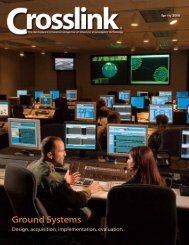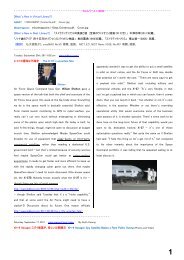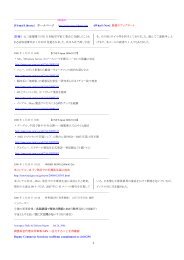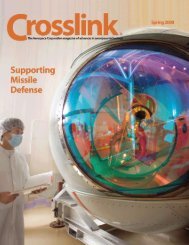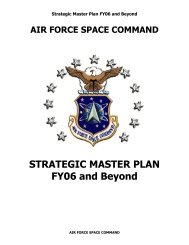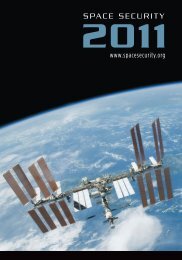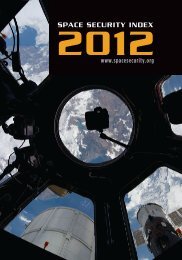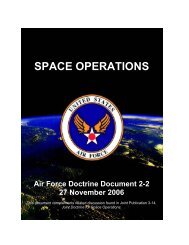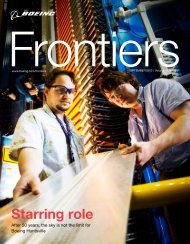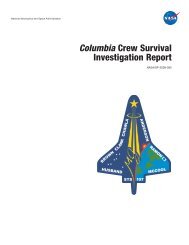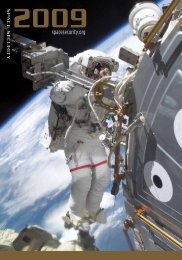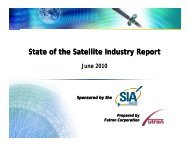17 - Space-Library
17 - Space-Library
17 - Space-Library
Create successful ePaper yourself
Turn your PDF publications into a flip-book with our unique Google optimized e-Paper software.
同 盟 国 は 宇 宙 資 産 を 防 衛 するために 結 束 する<br />
Allies unite in bid to defend space assets<br />
AUSTRALIA will join forces with the US to help protect satellite communications from deliberate sabotage.<br />
The move comes at a time when foreign powers such as China<br />
are increasingly asserting their authority in space. The move is<br />
aimed at ensuring the US and its allies maintain their dominance<br />
in space, which is fast emerging as a battleground of the future.<br />
The joint partnership, announced at yesterday's Ausmin meeting<br />
in Melbourne, mentioned China as a country that had taken<br />
"deliberate actions" to disrupt the operating environment for<br />
satellites in space. "<strong>Space</strong> is becoming increasingly congested<br />
due to the debris from over 50 years of space activities," the US<br />
and Australia said in a joint statement. "Debris can result from<br />
deliberate actions such as the 2007 Chinese anti-satellite test,<br />
which added over 6000 pieces of orbiting debris." The statement<br />
said the development of counter-space weapons that created<br />
more long-lived space debris posed "a direct and immediate<br />
threat to the rights of all nations to explore and use space for<br />
peaceful purposes". The joint partnership is likely to lead to US<br />
space sensors operating from joint facilities such as the Naval<br />
Communications Station at Exmouth in Western Australia. The<br />
collisions and gauge whether some accidents were deliberate<br />
acts of sabotage by foreign powers. The partnership is also<br />
designed to protect the Australian Defence Force, which relies<br />
heavily on space-based communications. "<strong>Space</strong> is critical to a<br />
variety of ADF systems as well as successful operations," the<br />
two countries said in a joint statement. "It is also important to<br />
broader national security interests, including intelligence<br />
collection." An effective attack against space-based<br />
communication systems would also affect aircraft and ship<br />
navigation, weather forecasting, disaster recovery and<br />
international phone networks. "The benefits of free use of space<br />
permeate almost every facet of our daily lives," the Ausmin<br />
statement said. Currently, 16,000 space objects, including<br />
satellites and space junk, are tracked by the US. A recent report<br />
by the Kokoda Foundation think tank called for Australia to do<br />
more to defend its strategic interests in space, saying the federal<br />
government needed to develop a more comprehensive space<br />
policy.<br />
sensors would help track space objects to predict potential<br />
http://www.theaustralian.com.au/national-affairs/defence/allies-unite-in-bid-to-defend-space-assets/story-e6frg8yo-1225949648595<br />
- - - - - - - - - - - - - - - - - - - - - - - - - - - - - - - - - - - - - - - - - - -<br />
Nov. 8, 2010<br />
finance.yahoo.com/news/<br />
Aerojet のエンジンは Delta Ii の 第 2 段 を 駆 動 し、COSMO-SkyMed コンステレーションを 打 上 げ<br />
Aerojet's Engine Powers Delta II Second Stage for the COSMO-SkyMed Constellation<br />
SACRAMENTO, Calif., Nov. 8, 2010 /PRNewswire-FirstCall/ --<br />
Aerojet, a GenCorp (NYSE:GY - News) company, announced that<br />
its engine helped propel Friday night's launch of the Delta II<br />
launch vehicle from Vandenberg Air Force Base (VAFB) in Calif.<br />
This is the fourth launch, completing the COSMO-SkyMed<br />
constellation. The overall objective of the COSMO-SkyMed<br />
program is global Earth observation, particularly in the<br />
Mediterranean area. Some applications of this constellation<br />
include analyzing effects of natural disasters; coastal surveillance<br />
to assess erosion and sea/river pollution, monitoring of farming,<br />
mapping forestry resources and urban buildings; and territorial<br />
security and strategic defense. The first three COSMO-SkyMed<br />
satellites were launched from Vandenberg in June 2007, Dec.<br />
2007 and Oct. 2008, respectively. The Delta II launch vehicle will<br />
deliver COSMO-4 into the same orbit as COSMO-1, COSMO-2<br />
and COSMO-3, where it will begin its dual-use mission of data<br />
observation and data recording for the needs of both the military<br />
and civilian communities. Under contract to the United Launch<br />
Alliance, Aerojet provides the Delta II rocket's liquid second<br />
stage engine. This same engine has supported numerous<br />
launches of critical NASA and Air Force missions. Aerojet's<br />
second stage engine has delivered payloads for NASA's space<br />
exploration such as MESSENGER, Phoenix Mars Lander, GLAST,<br />
THEMIS, STEREO, Deep Impact and the Mars Exploration Rovers,<br />
Spirit and Opportunity, as well as the USAF Global Positioning<br />
System (GPS) Block IIR fleet. "It's rewarding to be part of the<br />
team that is delivering this Earth observation program for the<br />
Italian <strong>Space</strong> Agency," said Delta II Program Manager Eric Veith.<br />
Aerojet is a world-recognized aerospace and defense leader<br />
principally serving the missile and space propulsion, defense and<br />
armaments markets. GenCorp is a leading technology-based<br />
manufacturer of aerospace and defense products and systems<br />
with a real estate segment that includes activities related to the<br />
entitlement, sale, and leasing of the company's excess real<br />
6



